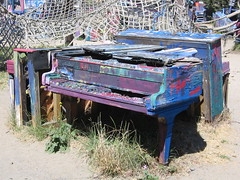Electrified
Hustle home to give your purchases a first listen. Pore over every detail of the liner notes--glossy or letterpress, wordy or succinct--and chide the artists who give short shrift to this aspect of their album; these days, it's half the reason for buying a disc. The soundtrack to Girl on a Motorcycle, for example, is the most fun item of the lot. (Fun? The insert unfolds to a small version of the original movie poster; hold it up to your waist and pretend those are your splendidly cat-suited hips! Oo la la.) The score, reminiscent of goofy '60s spy music, Les Baxter-ish percussion exotica, and the wooing haze of a Bond soundtrack, includes Hammond organ and steel guitar as well as the "real" sounds of motorcycles, people breathing, and church bells.
To dream or to dance? To dance or to dream? Between Colleen and Venetian Snares, you find music to suit either mood. Cecile Schott (Colleen) creates singularly moody pieces playing guitar, koto, glockenspeil, music box, harp, or glass wind chimes, but you wonder why this was filed under "electronic." The electronics (when present) lie well underneath the acoustic sounding instrumental minimalism. Oh, this explains it and makes you curious to hear her more thoroughly electronic music. Venetian Snares, on the otherhand, throws you out of Schott's dreamscape with bursts of a twentieth century orchestral composition that you can't quite name. The anechoic breaks between the string-section samples place you squarely in the world of electronic collage. The beats build up, but the Snares never leave the symphony far behind: the hilariously twisted take on the Elgar cello concerto doesn't even ruffle your classical music feathers, though the occasional distant cry of some opera diva is a little over the top. You try to make sense of the various spoken texts, particularly the rather unsettling one on pigeons, when the phone rings. Really--not as some exhilirating, laptop-processed beat-t-tt-t but your in-real-time phone.
It is a friend calling to tell you that Luc Ferrari has died. Oh. He performed at UC Berkeley a few years ago and proved that, when done this well, musique concrete can succeed in a concert hall setting. You were held transfixed while listening to Far West News, a travelogue in which, amidst the cleanly recorded sounds of car doors opening and closing and footsteps crunching on gravel, the question "what do you think of impeachment?" became a wry motive. You remember, too, first hearing Cellule 75 and appreciating the complete integration of percussion, piano, and electronics; the electronics, in a Ferrari composition, are necessary music, never just for effect. Set the Aquarius purchases aside for a moment, promising to listen again to them later, and put on Presque Rien. In the midst of your homage, wonder who might fit the niche precisely between Luc Ferrari and Venetian Snares. Who indeed?
continue reading...
 The little piano prelude
The little piano prelude 




